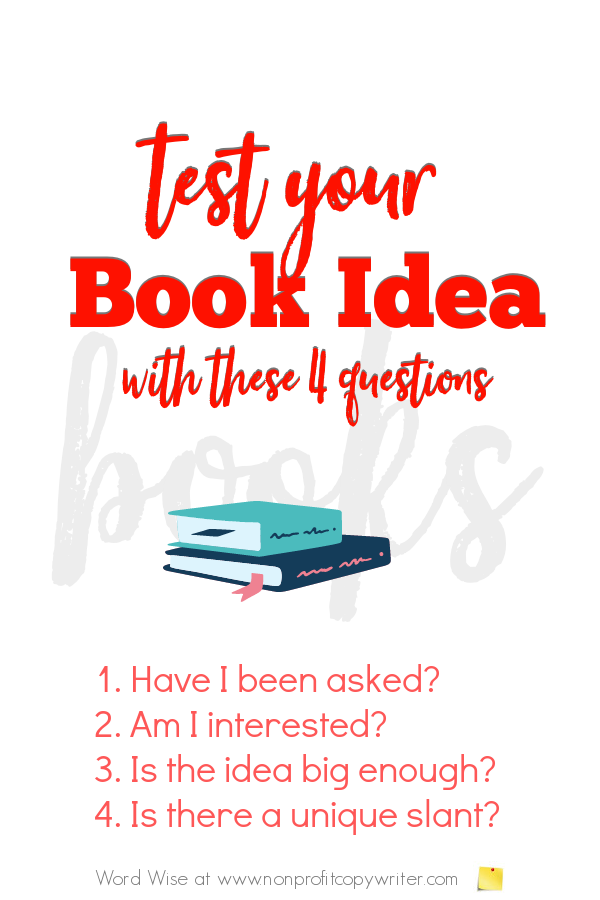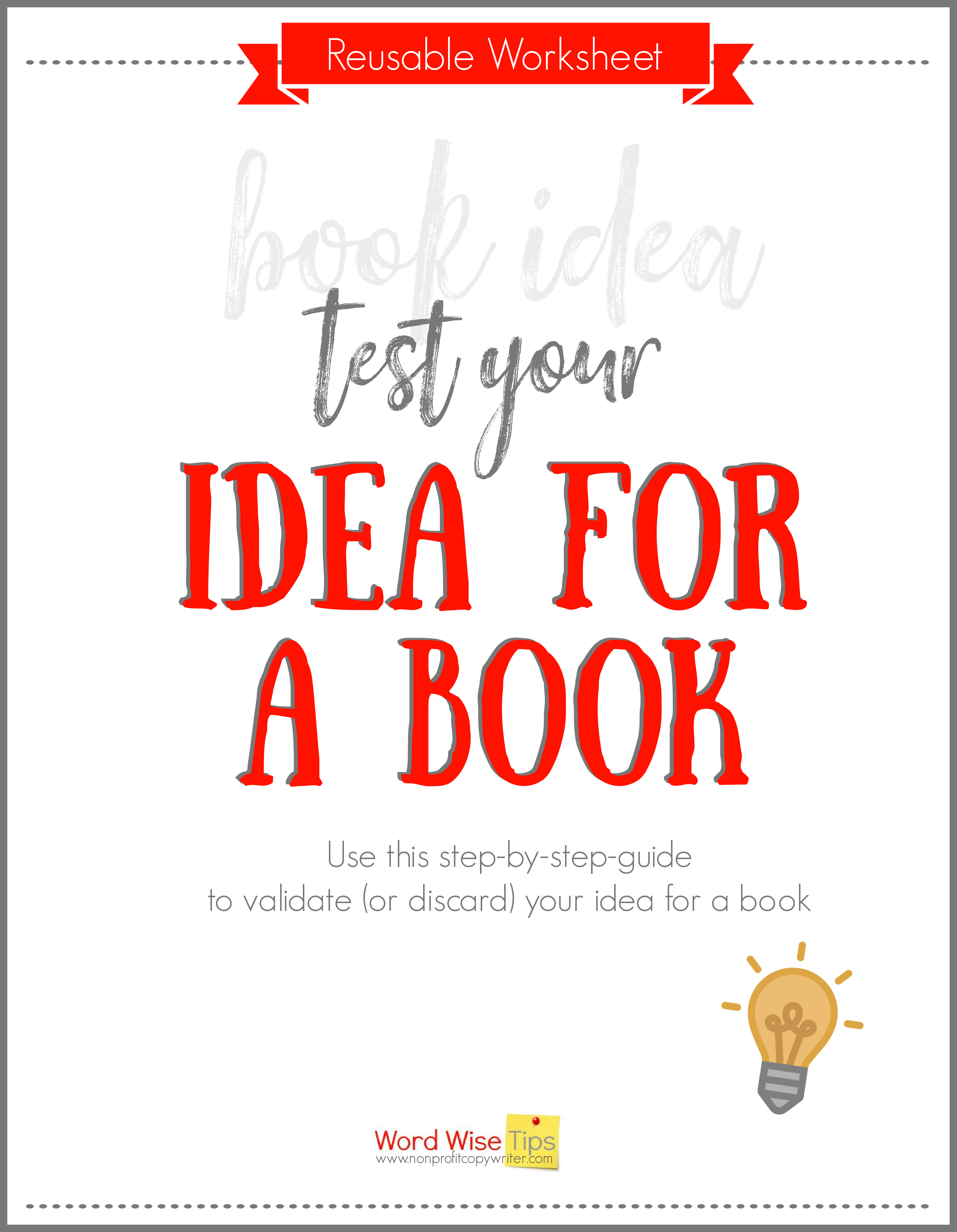Save Time: Get 5 Simple Writing Tips
you can put to use in 10 minutes
Test Your Book Idea With These 4 Questions
Award-winning writer Kathy Widenhouse has helped hundreds of nonprofits and writers produce successful content , with 750K+ views for her writing tutorials. She is the author of 9 books. See more of Kathy’s content here.
Updated 2.3.26
You’ve got a book idea. You’re gung-ho to get writing. But should you proceed?
Given the potential mine fields to writing a book and getting into the hands of readers, you want to make sure your idea is book-worthy. You’ll invest a significant amount of your time in writing the book. And once you start, you want to finish it rather than let your first pages languish in your uncompleted projects file.
But how can you know that the sweat and tears invested in this book will yield readers? You want to know that there’s an audience for your book idea.
These four questions can help you test your book idea. If your idea passes muster, then you can start writing your book with much more confidence.
Test Your Book Idea with These 4 Questions
Question 1: Have You’ve Been Asked to Write a Book – Directly or Indirectly?
I’ve been fortunate to be invited to write a book by an editor. That invitation made writing the book proposal and subsequent manuscript easier. The book idea originated with the publishing house. They had data showing reader demand.
But I’ve also written books that were requested by readers. In some instances, I heard these words more than once and from more than just one person: “You should write a book about that.”
Other times, the request for a book is more indirect. One book idea floated in my mind and in my notes for a while, only to be confirmed months later by comments from readers in phone conversations, emails, and on my Facebook page. They expressed a need to have information about a topic or the desire for a guide to help them with a particular project. Some of my writing friends have taken polls among potential readers to get confirmation for a book idea or feedback about its slant.
Your book idea is strong when people express an interest in the topic or slant, whether they ask you directly to write a book or you deduce their need or curiosity from comments.
Question 2: Do You Have Skill or Interest in the Topic?
“Once I learn something useful – typically a practical skill or process – I have a compulsion to write a how-to book sharing it with others,” says copywriter Bob Bly, author of nearly 100 books.
Even if you’re not an expert or have just minimal expertise in a topic, you can leverage your interest into writing a book. Writing a book is one of the fastest ways to master a subject. As you research, you learn more about the topic and subsequently become more of an authority than readers with little or no knowledge. And when the book is in print, you earn recognition as an expert in that subject matter.
In fact, your interest in the topic is a key barometer to your book’s success. As you write your book, you’ll spend plenty of time immersed in the subject matter. You’ll weed through what to include and what to set aside. Are you interested enough to keep writing even during setbacks?
When I was asked to ghost write a memoir, I did a bit of background on the topic … or rather, I should say that forced myself to research the subject. It didn’t take long to conclude that the book idea bored me to tears. While I was sorely tempted to agree to write the book because of its potential income, in the end I declined to pursue the project. I couldn’t see myself investing six months of writing time and lots of travel to write a book about a topic that set me snoozing.
Worksheet: use this step-by-step guide to validate or discard your book idea.
Question 3: Is Your Book Idea Is Big Enough?
As you examine your book idea, identify whether or not there is enough information to fill all the pages with substance.
Can you write out your book’s summary idea and then list seven elements to the process or identify ten different angles to your topic? You need statistics, case studies, anecdotes, and stories to fill the pages. Unless you can record six to fifteen chapters of components of the idea, it’s not really a book idea — it’s an article.
On the other side of the coin, let's say you have at least 10 subtopics you can include in your book. Can you unpack each of those kernels in 2,000-5,000 words - the average length of a nonfiction book chapter? If your answer is no, then your book idea may be too broad. You may have a book series idea instead. Narrow your focus!
Download your free copy and get started on your book now.
Question 4: Have You Identified the Book Idea’s Unique Niche?
What makes your book idea unique? To answer this question may take some detective work. Tens of thousands of books flood the marketplace, both in print and online. You need to identify what makes your book different from others. Study books that are already in circulation by completing a search on Amazon and in Books in Print.
As you study each book and take notes, you are working to identify a need in the marketplace for your book, whether it is in content, genre, readership, or format. By studying books that are already in circulation, you can position your book to fill a gap. And don’t worry if other writers have books about your particular topic – in fact, that can be a plus, because multiple books about a topic indicate reader interest.
If someone has already written a book that is similar to your idea, then identify whether or not your book idea takes a special slant, fills a different niche, or takes a different approach. How can your book stand out and solve the problem in a different way? What an unmet need will your book fill in the marketplace? What will your book cover about your topic that is not been covered in other books? Your goal is simple: you want to define how your book idea is different from other books already on the market.
Your Book Idea Passes the Test
You’ve been asked to write a book – whether directly or indirectly – and you’re skilled or at least interested in the topic. You’ve determined that there’s plenty of material you can cover in your book. And you’ve identified a unique niche for your book, one that is not covered by another book in the marketplace.
Congratulations! You’ve got a book-worthy idea. Now start writing.
More Book Writing Tips
Test your book idea with this useful worksheet ...
How To Get Started Writing a Book With a Brain Dump ...
3 Things I Wish I’d Learned Before Writing My First Book ...
How to Use a Personalized Book Writing Plan to Get Your Book Done ...
How to Test an Article Idea ...
Top Tip for Selling Your Book ...
Need to Write a Title for Your Book? Try This...
What Goes on the Back Cover of a Book?
How to Get Book Reviews For Free ...
5 Places to Find Book Ideas ...
How to Publish a Book for Free...
Write an Article or Write a Book? Here’s How to Decide ...
Getting started writing a book ...
Create a Chapter Outline for Writing a Book Using This Template ...
E-Books Versus Print Books: Which Do Readers Prefer?
Writing a Book Outline: It's Easier Than You Think ...
Tips on Writing a Book (Before You Get Started Writing) ...
See more tips for Writing a Book on my Pinterest board...
Return from Test Your Book Idea to Nonprofit Copywriter home
As an Amazon Associate I earn from qualifying purchases.
Share This Page

Named to 2022 Writer's Digest list
BEST GENRE/NICHE WRITING WEBSITE


Stop Wasting Time!
Grab your exclusive FREE guide, "5 Simple Writing Tips You Can Put to Use in 10 Minutes or Less"














